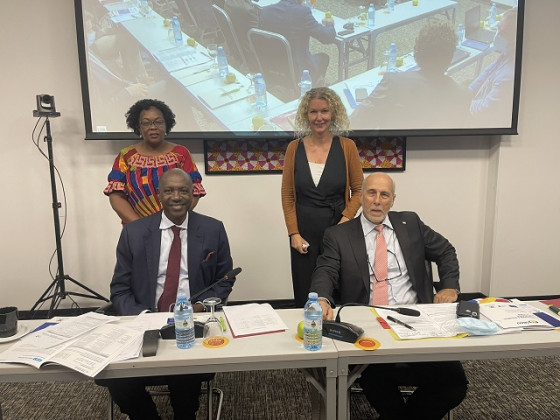The European Union and the Private Sector Foundation Uganda (PSFU) have revived the Sustainable Business for Uganda (SB4U), a trade improvement initiative that was disrupted by the COVID-19 outbreak, one year after its launch.
The platform launched in 2019 is aimed at enabling Uganda’s export sector to fully take advantage of the existing trade initiatives, like “Everything but Arms (EBA)”, which allows Uganda to export to Europe free of tariffs and quotas.
Uganda’s exports comprise mainly of agricultural products like coffee, fruits and vegetables, flowers, fish and fish products, while the country’s import earnings are from the energy, construction, agro-processing and tourism sector, among others. The exports were recorded at 500 million US Dollars in 2020, compared to the imports from the region worth 699 million US Dollars.
The EU Head of Delegation to Uganda Ambassador Attilio Pacifici, says there are many items that Europe needs from Uganda which would raise the export earning to beyond 1 billion US Dollars, but Ugandans are not usually aware of what the market demands. For this reason, the EU has set aside 170 million Euros (about 670 billion Shillings) for the next four years to facilitate sustainable investment, economic enablers and connectivity, skilling and decent jobs.
He says that apart from quality, quantity is also important because the developed market cares about stability in supply, and the funds will help Uganda’s business community understand the market and manage the risks involved.
The SB4U was supposed to host the second Uganda-EU Business Summit in 2021 but it was called off after the outbreak of the COVID-19 pandemic. The initiative is now revived with the holding of the third SB4U Board Meeting in Kampala, the launch of the Technical Working Groups as well as the Work Readiness Initiative for graduates.
The technical working groups were formed to tackle the three main challenges; skills and attitude among the working Ugandans, governance and accountability, trade and investment promotion and access to finance.
Elly Karuhanga, the Chairman of Private Sector Foundation Uganda says one of the main problems Ugandans face, apart from skills, is the attitude to work and the thought of getting money even before they get the idea of what they want to invest in. This he says will be part of the training or skilling under the initiatives to make Ugandans ready for the market.
On access to finance, the initiative will provide affordable loans to both Uganda and European investors who intend to improve production for export from Uganda to Europe, but training and providing information about the market will be free, according to Ambassador Pacifici.
Ugandans have the opportunity to continue exporting to the EU under what they call favourable terms, as the free trade deal, the Economic Partnership Agreement between the EU and the East African Community continues. The EPA has for long failed to materialise with the countries in the region failing to agree on the different clauses in the agreement.
Tanzania remains the most opposed to the idea of opening up the market to European products, although the tariffs on imports are to be lifted gradually. Tanzania and Burundi say the EPA puts the local industries at risk because the local products will be competing with European imports, while in Europe, the exports from the EAC will compete with other more developed countries that have preferential treatment under different initiatives.
Kenya has been pushing the other countries to sign and ratify the deal so that the region starts benefiting, while Uganda has said it will sign once all the countries agree. But Pacifici says the ABA arrangement that Uganda is currently enjoying is a temporary arrangement meant for least developed countries.
Kenya is no longer a beneficiary because it is in the middle-income bracket, while Tanzania is also due for removal from the list after being declared middle income in 2020. Ambassador Pacifici says it is only prudent that countries sign up so that they continue benefiting irrespective of their economic status.
Dr Karuhanga says everything grown in Uganda can be exported to Europe, provided it meets the standard requirements of the consumers.
If you would like your article/opinion to be published on Uganda’s most authoritative news platform, send your submission on: [email protected]. You can also follow DailyExpress on WhatsApp and on Twitter (X) for realtime updates.



